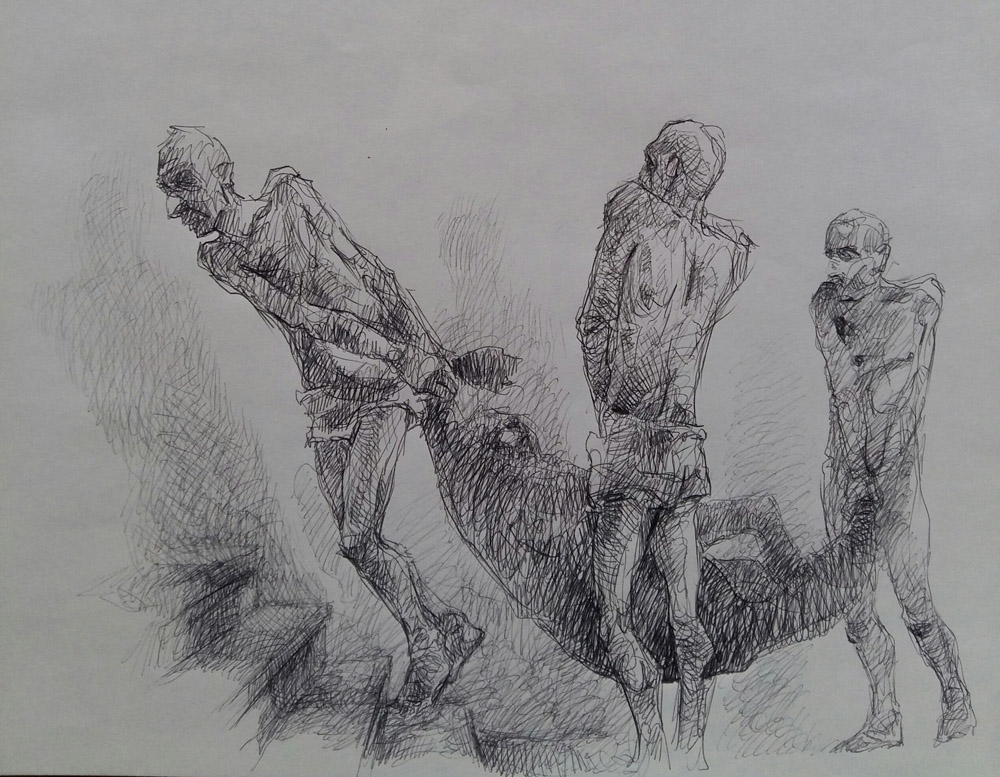When we were in Palestine branch, of course before start of the revolution, jailers used to stop torture if the prisoner loses consciousness. They were keen not to let him die during the torture course or maybe they were implementing orders of the prison director.
August 4, 2020

Source: The Association of Detainees and The Missing in Sednaya Prison
On May 2011 we arrived in the White Building (W.B.) in the prison of Sednayah. We were seven persons transferred from “Palestine branch” of the military intelligence service. The military police took us to a room, ordered us to take off our clothes, all of them, for inspection. We refused, some of us stayed in their under wear, others kept their trousers. Prisoners were surprised by this order. Arrival of officers accused of defection had started a long time, and jailers used to treat them rudely. We started arguing with them loudly, the officer contacted the prison director. They needed time to get used to our responses and to realize that we were old prisoners, members of an Islamic organization.
They isolated us in a special room, the last one on the right of the “W.B.,” adjacent to the room of the supervisors of dormitories. Our room had a window looking at the nearest mountains, so we used to see from afar a Shepheard who daily comes with his cattle, and to wait him as a procedure of sociability. We felt better than we were in the prisons of security services. Jailers treated us kindly, different from their treatment to those in other dormitories, and we were surprised by the harsh way they used to treat defecting officers. They used to torture them in the corridor in front of our dormitory, we heard their voices and could see them from the mesh at the bottom of the door. Interrogators used to ask detained military prisoners about their ranks and cities, and accuse them of betraying the “Country which they had been bred on its resources.” Any soldier had the freedom to abuse and humiliate any officer prisoner regardless of his seniority.

I remember that one day we heard loud noises and sharp cries. Jailers were inspecting the dormitories one after another. They used to take the prisoners out and punish them violently. Frankly we collapsed, although they did not approach our room. Just a few moments later, an officer entered our room and told us that we will be transferred to another prison where we can join other members of our Islamic organization, and be treated better and can be submitted to courts… The torture we had seen and heard was harsher than all we had seen or heard of in the prisons of the security services. We were sure that some of them had deceased result of the severe beating with iron rods and wooden sticks on all parts of their bodies, including heads. More than once, during our stay, we witnessed torture “parties,” and every time the military police cleaned blood and pus spots from the corridor after they end torture sessions.
When we were in Palestine branch, of course before start of the revolution, jailers used to stop torture if the prisoner loses consciousness. They were keen not to let him die during the torture course or maybe they were implementing orders of the prison director. But here, in Sednayah, they used to beat defectors with iron rods on their heads, and when the victim falls silent, they continue beating him. In fact, it was not beating, it was execution by beating.

We asked to bring us newspapers so that we know what is going on in the world, and they brought them. They brought us heaps of papers two months old, i.e. since the start of the revolution. We already have an idea about the way the regime fabricates news, so we could understand the real news from between the lines published in official newspapers which are forbidden to tell real facts. For example, once a paper said that the authorities had launched a campaign to arrest “terrorist groups” in Baniyas, and we understood that there were revolutionary movements in the city, and so on.
They treated us well, and they used to buy us whatever we want from “external canteens,” with the money we had in the “deposits.” Every now and then, an officer, probably a lieutenant, used to visit us, show us cordiality and ask us if we need anything.

We wanted to meet members of our group who were jailed in the Red Building, so we asked to be transferred there, but they advised us to wait until after being tried. In fact, two weeks after our arrival, we were submitted to a military court held inside the Red Building. There, we met our colleagues who were relaxed and apathetic about the instructions of the prison director, Talat Mahfouz… who was extremely arrogant but used to deal kindly with older prisoners. He warned us not to raise troubles and told us: “If you keep quiet nobody will harm you.” When our mates saw us led to the court blinded and hand cuffed, they protested loudly and asked the head of the court to transfer us to their ward.
We stayed three days only in the political prisoners’ ward in the Red Building when at the start of June, they began to release some prisoners and transfer others to civilian prisons in their governorates. I was transferred to Damascus Central Prison (in Adra).
